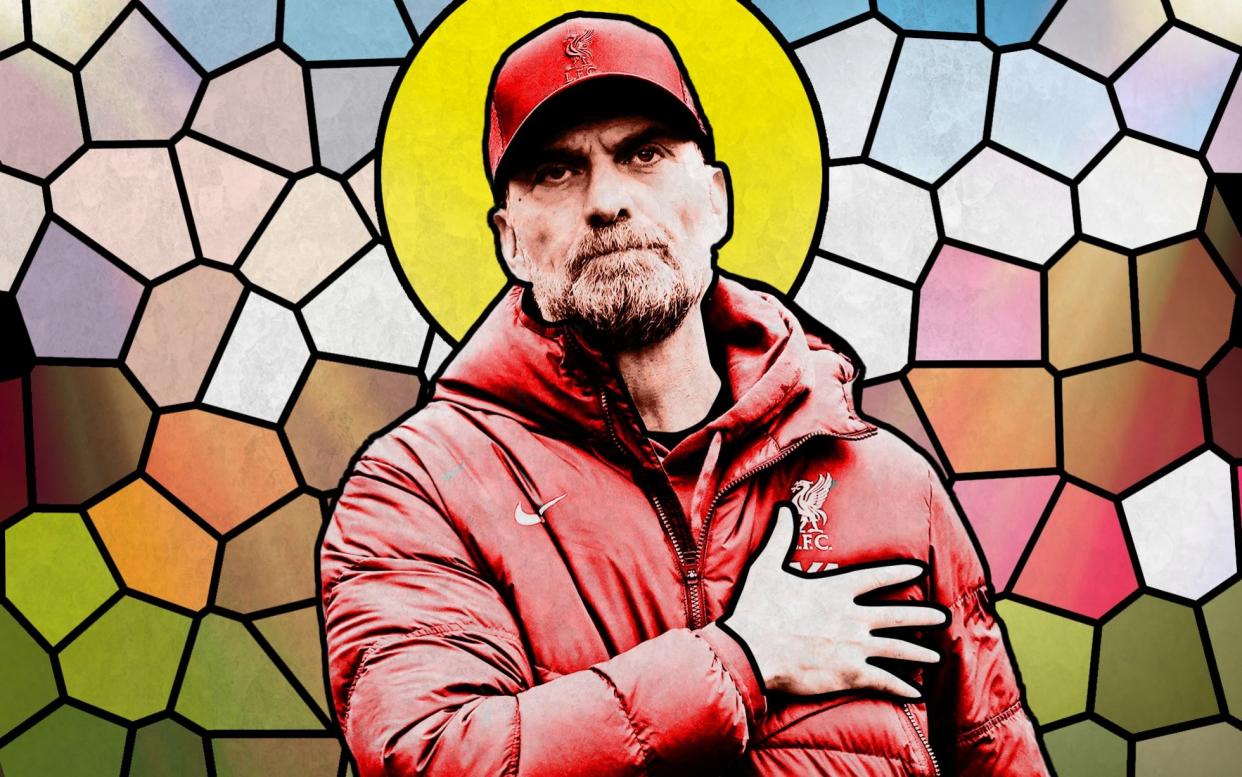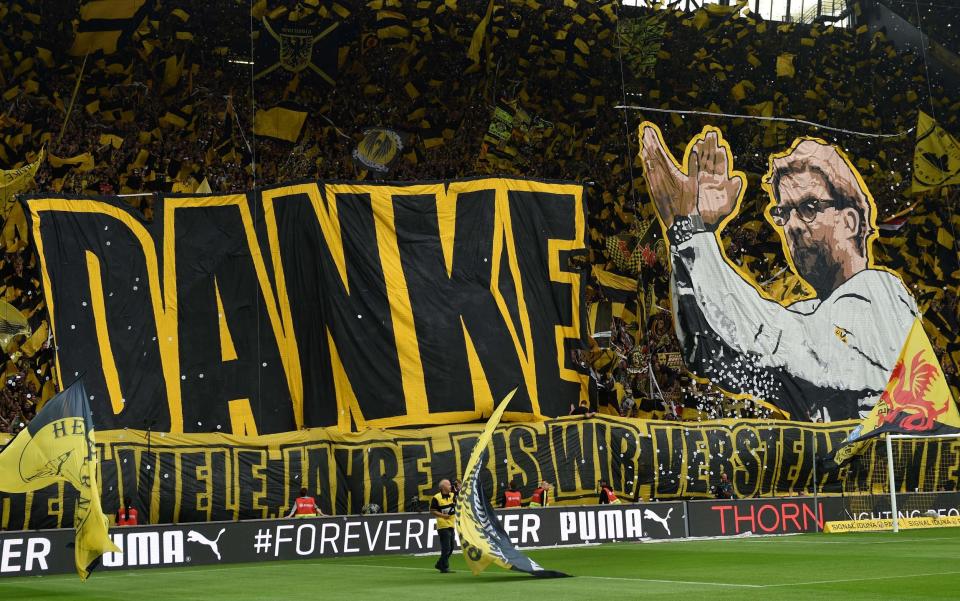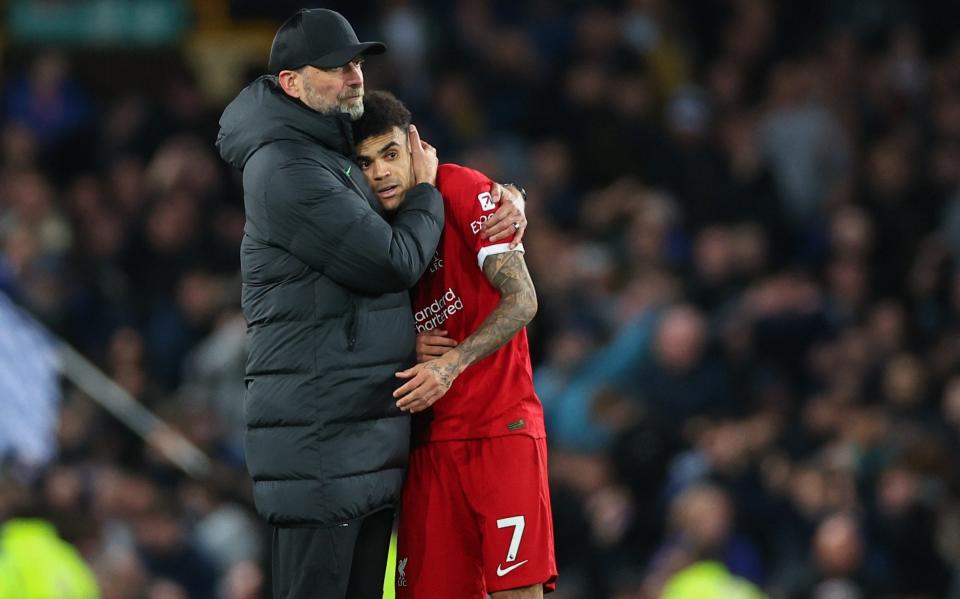Jurgen Klopp has earned messiah status at Liverpool but feeling is he should have won more

“Everything I am, everything I can be,” quavered Jurgen Klopp, tears streaming down his face, “it is because of you.” The year was 2008, and the setting was the Gutenbergplatz in Mainz. Over 20,000 people gathered in the city’s largest square in an expression of undying gratitude for all that Klopp had given to their club, first as a multi-functional player and later as the manager who inspired their first promotion to the Bundesliga. It was a giddy communion, on a scale that few in his role experience in a lifetime. And he was still just 40 years old.
The structure of Klopp’s touchline career is almost perfectly tripartite: seven years at Mainz 05, seven at Borussia Dortmund, nine at Liverpool. Each of these epochs has ended with his elevation to messianic status. If you thought the salute in 2015 by Dortmund’s Sudtribune was memorable, with a giant “Danke Jurgen” tifo festooned across the largest stand in Europe, just wait for the raptures to engulf him at Anfield in nine days’ time. Most managers pass through, their exits little lamented and their tenures soon forgotten. But with Klopp, who combines megawatt charisma with long-haul commitment, nobody is ever quite the same again.

At times, the idolatry can be excessive. When Klopp’s Dortmund team lapsed into relegation form during his final season, Wolfram Eilenberger, a German philosopher, ascribed the slump to their “unconditional belief in the saviour”, arguing: “They were no longer a club but a cult.” The hero worship has reached a similar pitch on Merseyside, with Klopp the only foreign-born person besides Nelson Mandela to be awarded the freedom of Liverpool. Some of his superstitions, such as allowing the full squad to touch the “This Is Anfield” sign only after this season’s Carabao Cup glory, are inescapably cult-like.
Not merely admired, but adored
The sheer force of his personality makes it difficult to reach a sober judgment on his Liverpool reign. Klopp is a figure about whom few can be agnostic: whether in joy or despair, he pulses with a magnetic energy. Even when Liverpool won nothing in his first year in charge, the club were only too happy to grant him a six-year contract extension. He is not just a manager but a mood, a spiritual leader of such power that he once had to clarify that he was not Mahatma Gandhi. He has mobilised an entire community in a shared quest, lifting his side’s dejection after a Europa League final defeat to Sevilla by striking up a “We are Liverpool” chant. For these reasons he leaves English football not merely admired, but adored.
And yet there is an alternative framing: that Klopp, for all the veneration, departs with the same number of league titles as Claudio Ranieri. The suddenness of Liverpool’s recent implosion in sight of a second championship, losing out of nowhere to Crystal Palace and Everton, has highlighted a familiar weakness of wobbling in sight of the prize. A similar accusation was levelled at his previous clubs, too. Mainz twice buckled, Devon Loch-style, within reach of promotion, while Dortmund offset their two Bundesliga triumphs with two near-misses. Does Klopp’s record at Liverpool – with two second-place finishes, a third and two fourths – represent an extension of that pattern?
The sky-blue behemoth
It would take a hard-hearted soul to damn him on this basis. After all, it has been Liverpool’s misfortune, throughout the Klopp period, to be pitted against the insuperable financial might of Manchester City. Yes, the club have a billionaire owner on whom to lean in John W Henry, but City have an entire Gulf state. As Klopp memorably put it: “Nobody can compete with City. We cannot act like them. It is not possible.”
The evidence backed him up: in 2019, Liverpool ended the season with 97 points, the third-highest haul of the Premier League era, and still it was only good enough to be runners-up. In 2022, they broke the rare 90-point barrier once more, but were thwarted again by the sky-blue behemoth. With City now under investigation for 115 alleged financial irregularities, all of which they deny, a view has taken root among Liverpool fans that Klopp’s one title should, on a more level playing field, be three.

Except Liverpool have hardly been parsimonious either. After the Loris Karius debacle in Kyiv, they spent £67 million to bring in Alisson in 2018, then a world-record fee for a goalkeeper. Conscious of compensating for Sadio Mane’s move to Bayern Munich, they paid £85 million for Darwin Nunez. These were not the luxury signings open to Ranieri’s Leicester City when they reached the summit in 2016. Klopp has been backed handsomely by Fenway Sports Group, but still he is no more decorated in the league than the man who coined the catchphrase “Dilly ding, dilly dong”.
The art of winning
In Europe, too, a solitary Champions League crown scarcely does justice to a manager of Klopp’s standing. As deliriously as Liverpool celebrated in 2019, with 750,000 people lining the parade route, they lost two other finals, both to Real Madrid, compounding the sense of thwarted ambition Klopp had felt when Dortmund succumbed to Bayern at Wembley. There is a theory, of course, that a final is only ever a flip of the coin. But a study of this generation shows some managers are far better versed in the art than others. Guardiola has won a staggering 26 of his 29 finals. Klopp’s hit rate, by contrast, is six of 13.
Not that you can possibly measure the Klopp effect by raw numbers alone. A tale of the tape cannot reflect all those times when he hauled his players off the floor, when he wandered into bars for casual meetings with fans, when he introduced his players to training-ground staff to foster a sense of common cause. He has given everything of himself to Liverpool, emotionally and ideologically attuned to those he represents. His absence will create a crater. It is the famous Maya Angelou line: that people forget what you said, and even what you did, but never what you made them feel. Klopp has earned this epitaph, many times over. But he closes his body of work at Anfield, spanning eight trophies, amid a sense that it could – and perhaps should – have been more.


